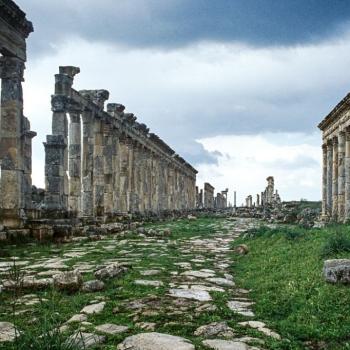This is the second reflection in our Advent Series "The Hopes and Fears of All the Years" by biblical scholars and homileticians John C. Holbert and Alyce McKenzie. For an overview of the series with links to all the reflections, click here.
The Second Sunday in Advent:
Isaiah 11:1-9
There are great dangers for our understanding when texts become too familiar. Once again we have entered the season of Advent, anticipating the birth of Jesus, hoping that this time the vast promises of peace may be fulfilled. As always, we look to Isaiah 11 for timeless metaphors with which we may again long for a day that seems unimaginably and terribly delayed. Classic treasures of art and music have fixed these metaphors in our mind and hearts, paintings to stir the eye and oratorios to tickle the ear. We gaze and listen with eagerness at wolves and lions, bears and sheep passively feeding together, being led by a tiny child who we know as the infant messiah. It is a portrait worthy of a greeting card -- and often is! "Have the most blessed of Christmases," we read, our eyes moist with sentiment and with disappointment.
This sort of peace is not available to us, and seemingly never will be, with terror stalking so many lands, with anger dividing peoples and nations into armed camps waiting for the least spark to set off still another conflagration of pain and death. In our world, wolves eat lambs and bears spit out straw to devour goats. What sort of sentimental clap-trap is this Isaianic picture of animal peace? Just what sort of person are we waiting for? Will the real messiah please stand up!
Whom do we imagine Isaiah had in mind when he uttered this oracle so long ago? The key, I think, is found in the 72nd Psalm. Scholars nearly universally assume that Psalm 72 is a coronation poem, sung at the investiture of the kings of Israel. What Israel hoped from its kings can be found in the verses of this psalm, and those hopes are remarkable indeed. The first verse sets the tone: "Give the king your justice, O God, and your righteousness to the king's heir." The two powerful words that characterize the prophets of Israel -- justice and righteousness -- are to be hallmarks of any king of holy Israel. Immediately in verse 2, the poet concretizes the use of those attributes: it is "the people" who are to judge with righteousness, and it is specifically "the poor" who are to be judged with justice. The mountains are requested to yield "prosperity" in verse 3, but prosperity for the land is measured not in GDP but in "righteousness." Verse 4 sums up the hope of Israel for the king: "May he defend the cause of the poor of the people, give deliverance to the needy, and crush the oppressor."
Note something important about the opening of this psalm. There is no talk yet of power, of long life, of pomp and pageantry. The only talk is of basic concern for justice for the poor, the needy, the oppressed. Kings of Israel are only defined by their basic attention to that central concern. And with that understanding we may return to Isaiah 11.
The prophet longs again for such a king, a "shoot from the stump of Jesse," the great David's father. Like many in Israel, Isaiah is anxious for a real Davidic king, a genuine sign of the presence of God in the land (see 2 Samuel 7 for the origin of an eternal Davidic kingship). But he certainly does not want another David, no more liar, murderer, adulterer, one heartless in his abuse of Bathsheba and her doomed husband, satisfying his own selfish and pathetic desires. No! The "spirit of YHWH will rest on him, a spirit of wisdom and understanding, a spirit of counsel and might, a spirit of knowledge and the fear of the Lord" (verse 2). Unlike the monstrous David, this king will embody the qualities of the king of Psalm 72. Filled with deep wisdom, profound understanding, discerning and powerful counsel, genuine knowledge rooted in the awe of YHWH, this king's very delight will be in "the awe and worship - fear -- of YHWH."
How will we see these attributes at work? "He will not judge by what his eyes see, nor decide by what his ears hear." In other words, he will not make his judgments based on outward appearances only; if one is rich and well-spoken, he/she will have no advantage over one who is poor and mute, because "with righteousness he shall judge the poor and decide with equity for the meek of the earth" (verse 4ab). His weapons against oppressors will not be sword and shield, but "the rod of his mouth" and "the breath of his lips" (verse 4cd). "Righteousness" and "faithfulness" he will wear around him like a belt (verse 5). Isaiah aches for a psalmic king, one who will live the life described by Israel's prophets from Amos to Ezekiel, but has rarely if ever been crowned. When a king like that shows up, then, and only then, can we have peace in our world.





